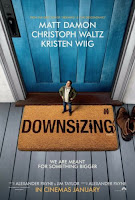Soon, though, it changes tone. The wife doesn't go through with the process, leaving Paul alone in his new mansion. They divorce, and he ends up obviously lonely in a much smaller apartment. There's a lot about the emptiness of material satisfaction and consumerism, and then suddenly there's class. Not all of the small people are rich...there are poor small people who live outside the gated community, travel in on gritty buses, and do all the rotten jobs. They live in concrete sheds roughly fitted out for smalls...and there was something about the depiction that reminded me of the Torre David in Venezuela. And then - through a sort of friendship with a Vietnamese woman dissident who was shrunk against her will as punishment, and with the Balkan wheeler-dealers who live in the apartment above, Paul rediscovers people and community.
I won't do turn by turn descriptions of the plot, some of which is a bit contrived, but I thought it was an interesting film with a good message and drive-by touches on a lot more...there's climate change, class, and a postive drug experience. In fact, I've noticed that most depictions of party drugs in contemporary American films seem to be positive (unlike depictions of cocaine, heroin or alcohol)...is this because the film makers known that showing them otherwise would just not be plausible to their target audience, who have grown up with this stuff and know it's mainly OK?


No comments:
Post a Comment